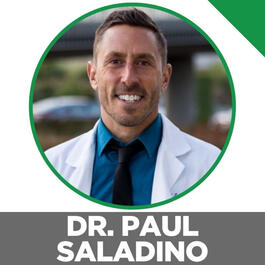
The Toxicity Of Plants, Carnivore For Athletes, Does Meat Cause Acidity, The “Game Changers” Debate & Much More With Dr. Paul Saladino.
Paul Saladino is back. The CarnivoreMD, after originally appearing on my show in the episodes... - Everything You Need to Know About the Carnivore Diet - Carnivore Diet, Cleaning Out Your Colon, Eating Brains, Hunting Zebras & Much More ...has just put the finishing touches on his new book The Carnivore Code, and graciously agreed to record an epic solosode for my listeners in which he delves into all the questions you asked him in the comments section after our first couple episodes together. Prepare for a complete carnivore education, including: -How Paul defines the carnivore diet...5:42 It's a diet that emphasizes and focuses on animal foods The majority of our nutrients comes from animal foods Aware of plant toxicity; minimal (or no) plant matter The best place for vitamins and minerals is animals, with the exception of Vitamin C "Nose to tail" idea Most toxic plant foods: Grains, legumes, nuts, seeds Seeds are highly defended by the plants; high levels of toxicity Most leafy greens are toxic for humans High oxalate foods - almonds, root veggies Moderately toxic: High fructose foods: honey, berries Sweet potatoes, other sweet tubers and roots Least toxic: Avocados, olives, squash Ben's cronometer of his daily diet A carnivore diet is not simply muscle meat Nose to tail Includes bones, marrow, cartilage Carnivore diet is a "soft" keto diet 1:1 ratio (1 gram of protein per pound of body weight) -How the carnivore diet affects athletic performance...17:25 1. Metabolic characteristics of keto-adapted ultra-endurance runners 2. Effects of a 4-Week Very Low-Carbohydrate Diet on High-Intensity Interval Training Responses 3. Keto-adaptation enhances exercise performance and body composition responses to training in endurance athletes Ensure you check your salt levels if on a low-carb diet (10+ grams per day) -How to get adequate iodine while on the carnivore diet...29:30 Redmond Sea Salt (from the ground in Utah) No microplastics 10 g of Redmond has 150 mcg of iodine (equivalent to the RDA) Red meat Egg yolks (100 mcg w/ 4 egg yolks) Don't take too much iodine -Whether the entire global population could be on a carnivore diet...32:45 Is the current agricultural system working? Currently U.S. system is mono crop agriculture (nutrient depletion, no animals to replenish nutrients) Just plants on land is "feed lot feeding" of plants Regenerative agriculture (ecosystem feeding) Grass feeding and finishing is the optimal situation Regenerative agriculture is carbon negative White Oak Pastures is a good example of regenerative agriculture Multiple species on the same lot reduces parasite presence The current agriculture system is unsustainable -Why the stressor of eating plants is different from a "good" stressor like exercise...42:09 Plant molecules are plant pharmaceuticals Plant and human biochemistry and mutually dependent There is no "package insert" of side effects that comes when eating plants Paul's first podcast w/ Ben talked about "collateral damage" in plants Plants ameliorate symptoms, not treating the root cause Glutathione levels in cold water study We don't need sulforaphane to get adequate glutathione If we live a "radical lifestyle" of environmental hormetics, we don't need the plant molecules Studies referenced: 4. Uric Acid and Short-Term Glutathione Levels During Whole Body Cold Exposure -How the carnivore diet activates pathways in our bodies...54:50 Environmental hormetics: heat, cold, exercise, etc. Nrf2 pathway is affected positively by plant intake Sirtuin pathways activated by resveratrol Doses in a nose to tail diet are adequate Studies referenced: 5. Ketogenic Diet Modulates NAD+-Dependent Enzymes and Reduces DNA Damage in Hippocampus 6. Nutritional Ketosis Increases NAD+/NADH Ratio in Healthy Human Brain: An in Vivo Study by 31P-MRS 7. Ketones improves Apolipoprotein E4-related memory deficiency via sirtuin 3 8. Keto-adaptation enhances exercise performance and body composition responses to training in endurance athletes 9. Effect of increasing fruit and vegetable intake by dietary intervention on nutritional biomarkers and attitudes to dietary change: a randomised trial 10. Resveratrol Reduces the Levels of Circulating Androgen Precursors But Has No Effect on, Testosterone, Dihydrotestosterone, PSA Levels or Prostate Volume. A 4-Month Randomized Trial in Middle-Aged Men 11. Placebo-controlled, randomised clinical trial: high- dose resveratrol treatment for non-alcoholic fatty liver disease 12. The Essential Medicinal Chemistry of Curcumin 13. The dark side of curcumin -Do PH levels reach acidic levels on the carnivore diet?...1:13:36 Yes, if it is not constructed properly Acid load is balanced on: protein and minerals If we get enough minerals, it will balance the protein acidity Many on the carnivore diet don't get enough calcium Many minerals that are only present in bones Bone broth is the easiest way to do this (just add vinegar) Studies referenced: 14. Estimation of the renal net acid excretion by adults consuming diets containing variable amounts of protein 15. Potential renal acid load of foods and its influence on urine pH 16. Estimation of Renal Function in Patients with Eating Disorders 17. Effect of Low-Carbohydrate High-Protein Diets on Acid-Base Balance, Stone-Forming Propensity, and Calcium Metabolism 18. Essential and toxic metals in animal bone broths 19. Effect of a supplement rich in alkaline minerals on acid-base balance in humans 20. Effects of fruit and vegetable consumption on inflammatory biomarkers and immune cell populations: a systematic literature review and meta-analysis -IGF and mTOR when it comes to the carnivore diet...1:26:32 Paul's podcast w/ James Clement: Will eating an animal based diet over-activate mTOR? The Switch by James Clement No ketones in the blood is not a good thing Depleted liver glycogen produces ketones High carb diet will activate mTOR Balance w/ intermittent or complete fasting Gain muscle on a carnivore diet by eating more frequently: 4 oz. of meat 3-4 times a day Paul's podcast w/ Gabrielle Lyon: Does protein cause cancer? -Is the carnivore diet a concern for Alzheimers?...1:30:57 APO e4 is a variant of apolipoprotein E It is the most ancestral isoform "It was eating meat that made us human" Paul's podcast w/ Tommy Wood: Should you worry about ApoE4 on a keto/carnivore diet and how to avoid Alzheimer’s disease APO e4 is only an issue if we're insulin resistant The vast majority of Americans are insulin resistant It can be beneficial in populations that are not insulin resistant Remain in the elite of the population (insulin sensitive) Studies referenced: 21. Apolipoprotein E4 is associated with improved cognitive function in Amazonian forager-horticulturalists with a high parasite burden 22. Inflammatory Gene Variants in the Tsimane, an Indigenous Bolivian Population with a High Infectious Load 23. Prevalence of Optimal Metabolic Health in American Adults: National Health and Nutrition Examination Survey 2009–2016 24. APOE ε4, the door to insulin-resistant dyslipidemia and brain fog? A case study 25. APOE genotype influences insulin resistance, apolipoprotein CII and CIII according to plasma fatty acid profile in the Metabolic Syndrome 26. High Dietary Saturated Fat Intake Accentuates Obesity Risk Associated with the Fat Mass and Obesity–Associated Gene in Adults 27. Controversies Surrounding High-Protein Diet Intake: Satiating Effect and Kidney and Bone Health 28. Cholesterol, APOE genotype, and Alzheimer disease: An epidemiologic study of Nigerian Yoruba -What about doing a carnivore diet w/ FTO mutations and are an over methylator?...1:42:28 Saturated fats come from mislabeled trans fats or junk food People who eat animal products eat more healthy saturated fats Epidemiology can only produce hypotheses Paul's typical daily diet: 16 oz. grass fed organic steak 85 g of suet mixed w/ homemade bone broth 4-5 egg yolks w/ a generous serving of salt For dinner: all of the above, plus liver, brain, heart, suet w/ bone broth and salt There are no over or under methylators Get riboflavin from organ meats and heart (need 2-3 mg per day) -What do Paul's lab results look like?...1:50:00 LDL-HDL levels No correlation between HDL when LDL rises and cardiovascular disease The higher the LDL, the longer we live (provided we're insulin sensitive) -Rapid fire questions...1:53:54 How long should you do the carnivore diet before you know of its efficacy? No "cheat days" - don't reward yourself w/ bad food Carnivore diet benefits is from an immunological perspective Minimum 60 day reset is advocated in the book Are chicken and eggs okay on the carnivore diet? Info that says animal products are low in Vitamin K count only Vitamin K1; they are high in Vitamin K2 Eggs are fine; Paul prefers the yolks only What parts of the animal should you not eat? The adrenals Does Paul take supplements? None at the moment Would a woman need time to adapt to the carnivore diet? Is the carnivore diet advisable for pregnancy, breast feeding or children? -Phospholipid forms of DHA w/ the carnivore diet...2:01:48 We get phospholipids from our food Paul is not a fan of omega 3 supplementation (they're highly oxidized) -Do cruciferous vegetables cause hypothyroidism?...2:05:23 29. Genotoxic effects of crude juices from Brassica vegetables and juices and extracts from phytopharmaceutical preparations and spices of cruciferous plants origin in bacterial and mammalian cells 30. Concentrations of thiocyanate and goitrin in human plasma, their precursor concentrations in brassica vegetables, and associated potential risk for hypothyroidism 31. Iodine deficiency disorders and endemic goiter 32. Role of dietary iodine and cruciferous vegetables in thyroid cancer: a countrywide case–control study in New Caledonia 33. Estrogenic Effects of Extracts from Cabbage, Fermented Cabbage, and Acidified Brussels Sprouts on Growth and Gene Expression of Estrogen-Dependent Human Breast Cancer (MCF-7) Cells 34. Genotoxicity studies of organically grown broccoli (Brassica oleracea var. italica) and its interactions with urethane, methyl methanesulfonate and 4-nitroquinoline-1-oxide genotoxicity in the wing spot test of Drosophila melanogaster -And much more! Resources from this episode: -The Carnivore Code by Dr. Paul Saladino -BGF podcasts w/ Paul Saladino: Everything You Need to Know About the Carnivore Diet Carnivore Diet, Cleaning Out Your Colon, Eating Brains, Hunting Zebras & Much More -Fundamental Health podcasts mentioned: James Clement: Will eating an animal based diet over-activate mTOR? Gabrielle Lyon: Does protein cause cancer? Tommy Wood: Should you worry about ApoE4 on a keto/carnivore diet and how to avoid Alzheimer’s disease Dave Feldman Paul's lab results Jamie Seeman -The Switch by James Clement -White Oak Pastures -Ben's new album, Rocky Roots -Studies mentioned by Paul: Metabolic characteristics of keto-adapted ultra-endurance runners Effects of a 4-Week Very Low-Carbohydrate Diet on High-Intensity Interval Training Responses Keto-adaptation enhances exercise performance and body composition responses to training in endurance athletes Uric Acid and Short-Term Glutathione Levels During Whole Body Cold Exposure Ketogenic Diet Modulates NAD+-Dependent Enzymes and Reduces DNA Damage in Hippocampus Nutritional Ketosis Increases NAD+/NADH Ratio in Healthy Human Brain: An in Vivo Study by 31P-MRS Ketones improves Apolipoprotein E4-related memory deficiency via sirtuin 3 Keto-adaptation enhances exercise performance and body composition responses to training in endurance athletes Effect of increasing fruit and vegetable intake by dietary intervention on nutritional biomarkers and attitudes to dietary change: a randomised trial Resveratrol Reduces the Levels of Circulating Androgen Precursors But Has No Effect on, Testosterone, Dihydrotestosterone, PSA Levels or Prostate Volume. A 4-Month Randomized Trial in Middle-Aged Men Placebo-controlled, randomised clinical trial: high- dose resveratrol treatment for non-alcoholic fatty liver disease The Essential Medicinal Chemistry of Curcumin The dark side of curcumin Estimation of the renal net acid excretion by adults consuming diets containing variable amounts of protein Potential renal acid load of foods and its influence on urine pH Estimation of Renal Function in Patients with Eating Disorders Effect of Low-Carbohydrate High-Protein Diets on Acid-Base Balance, Stone-Forming Propensity, and Calcium Metabolism Essential and toxic metals in animal bone broths Effect of a supplement rich in alkaline minerals on acid-base balance in humans Effects of fruit and vegetable consumption on inflammatory biomarkers and immune cell populations: a systematic literature review and meta-analysis Apolipoprotein E4 is associated with improved cognitive function in Amazonian forager-horticulturalists with a high parasite burden Inflammatory Gene Variants in the Tsimane, an Indigenous Bolivian Population with a High Infectious Load Prevalence of Optimal Metabolic Health in American Adults: National Health and Nutrition Examination Survey 2009–2016 APOE ε4, the door to insulin-resistant dyslipidemia and brain fog? A case study APOE genotype influences insulin resistance, apolipoprotein CII and CIII according to plasma fatty acid profile in the Metabolic Syndrome High Dietary Saturated Fat Intake Accentuates Obesity Risk Associated with the Fat Mass and Obesity–Associated Gene in Adults Controversies Surrounding High-Protein Diet Intake: Satiating Effect and Kidney and Bone Health Cholesterol, APOE genotype, and Alzheimer disease: An epidemiologic study of Nigerian Yoruba Genotoxic effects of crude juices from Brassica vegetables and juices and extracts from phytopharmaceutical preparations and spices of cruciferous plants origin in bacterial and mammalian cells Concentrations of thiocyanate and goitrin in human plasma, their precursor concentrations in brassica vegetables, and associated potential risk for hypothyroidism Iodine deficiency disorders and endemic goiter Role of dietary iodine and cruciferous vegetables in thyroid cancer: a countrywide case–control study in New Caledonia Estrogenic Effects of Extracts from Cabbage, Fermented Cabbage, and Acidified Brussels Sprouts on Growth and Gene Expression of Estrogen-Dependent Human Breast Cancer (MCF-7) Cells Genotoxicity studies of organically grown broccoli (Brassica oleracea var. italica) and its interactions with urethane, methyl methanesulfonate and 4-nitroquinoline-1-oxide genotoxicity in the wing spot test of Drosophila melanogaster Episode sponsors: -Kion Coffee: Carefully selected and roasted for taste, purity, high antioxidants and health. BGF listeners receive a 20% discount when you use discount code: BGF20 -Organifi Gold Chocolate: A new take on an ancient secret: Pain-soothing herbs, incredible antioxidants, and phytonutrients all in one delicious, soothing “Golden Milk” nighttime tea! Receive a 20% discount on your entire order when you use discount code: BENG20. -ButcherBox: Delivers healthy 100% grass-fed and finished beef, free-range organic chicken, and heritage breed pork directly to your door on a monthly basis. All their products are humanely raised and NEVER given antibiotics or hormones. For 2 lbs of 100% grass-fed beef and 2 lbs of pure bacon for FREE, PLUS $20 off your first box go to ButcherBox.com/BEN OR enter promo code BEN20 at checkout. -Magic Spoon: A brand new company that has reimagined all your favorite childhood breakfast cereals. Low carb, keto-friendly, ZERO sugar, and tastes just like you remember. For free shipping on your order at Magic Spoon, use discount code: BENGREENFIELD Got a question or comment for me or Paul Saladino? Drop a comment below, and he or I will reply! See omnystudio.com/listener for privacy information.
From "Boundless Life"




Comments
Add comment Feedback